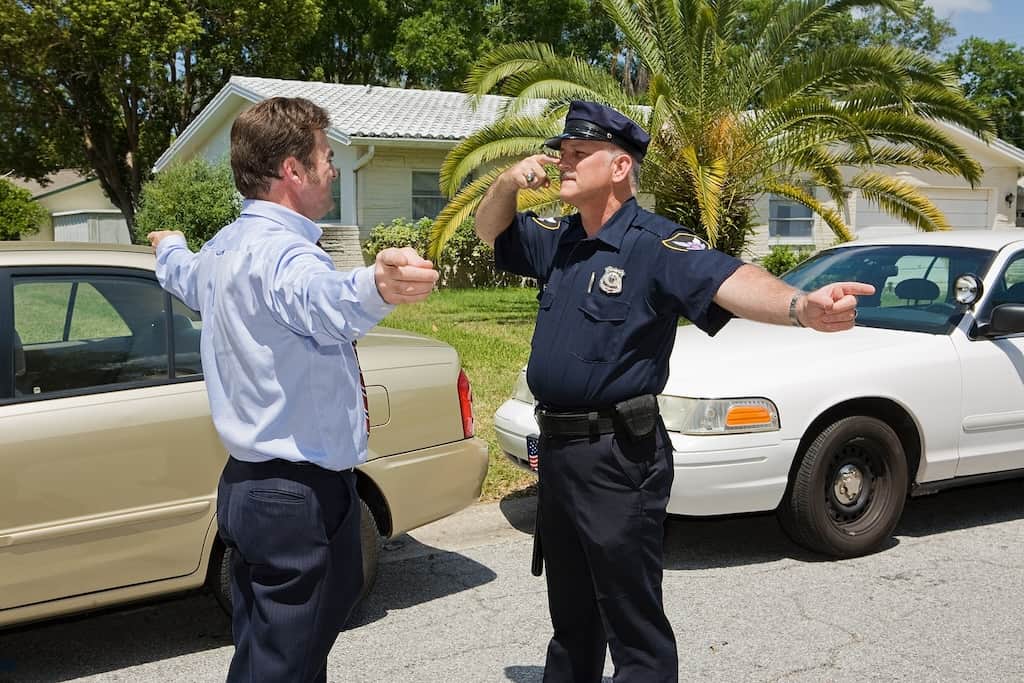
Pros and Cons of Refusing to Take a Field Sobriety Test in Ohio.
If you are stopped by the Ohio police for a suspected DUI (aka “OVI”), you must know your rights. As an Ohio citizen, if the police pull you over and suspect you of driving under the influence (DUI), they usually ask you to submit to a field sobriety test.
You might wonder, can you refuse a field sobriety test?
It’s important to know that you do have the legal right to refuse a sobriety test, but the real question is whether you should do so. Although refusing a field sobriety test is within your rights, it may put you at greater risk and could make a potential DUI conviction even worse. That said, before you refuse the police officer’s request, you must understand the possible consequences of this decision.
Because of Ohio’s laws on “Implied Consent Statutes,” whether you take the test or not, the police can still arrest you, suspend your license, and more.
If you decline field sobriety tests, then the time your license is suspended will depend on whether this is your first offense. Even for a 1st offense, refusing a field sobriety test can lead to a 1-year suspension for a DUI, with longer suspensions for subsequent offenses. By not taking the field sobriety test, your license suspension may be longer than if you had taken it in the first place. If you do take the test, your license suspension may be only 90 days.
So, if you are putting yourself at risk by choosing to decline field sobriety tests, why do so many Ohio residents refuse to take them? You must remember that you have the legal right to refuse a field sobriety test, but the real question is whether you should do so.
Although legally allowed to decline field sobriety tests, you may put yourself at more risk and make a potential DUI conviction even worse. Before you refuse a police officer’s request, it’s important to understand the potential outcomes of this decision.
The main reason is that without taking the field sobriety test, the prosecution may not have the potential evidence needed to make a substantial DUI case against you in court. Of course, the prosecution will still use your refusal to submit to the test as part of their argument, but this doesn’t carry near as much weight if there is additional evidence from chemical tests (such as breathalyzer or blood testing) to prove their case.
You must also understand that law enforcement officers are trained to gather as much evidence as possible during a DUI stop, and refusing certain tests may create legal consequences. You can refuse to take the test, but you are taking legal risks by doing so.
Whether you decide to take the field sobriety test or not, getting a complete case evaluation from a professional, experienced Cincinnati DUI lawyer is always your best strategy and should be done as soon as possible.
What Is “Field Sobriety Testing?”
If the Ohio police stop you and suspect you of a DUI (or OVI), they will use the results of a field sobriety test to determine if you are driving under the influence of alcohol or drugs. Several types of field sobriety tests are commonly administered, including the “walk and turn” test, the “one leg stand” test, or the horizontal gaze nystagmus vision test. Each is designed to help officers assess balance, coordination, and ability to follow instructions.
When you take these physical tests, law enforcement officers are trained to look for subtle signs of impairment. For example, in the one leg stand test, you will be instructed to raise one foot six inches off the ground and count aloud until told to stop. If you sway, hop, put your foot down, or cannot maintain balance, the officer may interpret this as a sign of drunk driving. Similarly, the horizontal gaze nystagmus test involves tracking the officer’s finger or a small object with your eyes; involuntary jerking of the eyes is often cited as evidence of intoxication.
The problem with these tests is that they are not always accurate. Many medical conditions, such as inner ear problems, back injuries, neurological disorders, or even fatigue, can cause a person to struggle with balance or coordination. Anxiety during a late-night traffic stop, poor footwear, or uneven pavement can also make it hard to perform well. These outside factors may create the appearance of impairment even when a driver has not been drinking.
Because the results are subjective, field sobriety tests often give officers the justification they need to establish probable cause for an arrest. Once probable cause is claimed, the officer can require further chemical tests, such as a breathalyzer or blood draw, to gather additional evidence. This is why attorneys often caution drivers about voluntarily taking these roadside exams. Even if you believe you are sober, the officer’s interpretation of your performance could still lead to an arrest.
It is important to understand that you do have the right to refuse a field sobriety test in Ohio. However, refusal may carry its own risks, since officers can still arrest you based on other observations such as the smell of alcohol, erratic driving, or slurred speech. They may also note your refusal in their report, which could influence how the prosecution builds its case. That said, refusing the test may limit the evidence available against you, which can sometimes work to your advantage in court.
If you consent to a test, everything from your ability to walk a straight line to whether you can maintain balance while standing on one foot becomes part of the officer’s evaluation. Unfortunately, these tasks are challenging even for sober individuals, and the subjectivity leaves plenty of room for error.
At Ernst & Associates, we understand the weaknesses of field sobriety testing. Our defense strategies often involve questioning how the test was conducted, whether proper procedures were followed, and whether medical conditions or environmental factors unfairly influenced the results. By challenging the officer’s conclusions, we can often limit or exclude the field sobriety evidence presented in court.
Ultimately, agreeing to a roadside field sobriety test is a decision that should not be taken lightly. These tests may give the state more evidence to argue a case of drunk driving, even when the results are questionable. If you have been arrested for OVI after taking—or refusing—a sobriety test, our experienced attorneys are ready to fight for you. We will carefully review your case, challenge the validity of the tests, and protect your rights at every stage of the process.
Additionally, there are some reasons why you should never take these tests, as some physical and mental/medical conditions may work against you, such as:
- You are not physically fit in the first place.
- You are unduly stressed when being questioned by police.
- You are fatigued or simply worn out physically.
- You’re in a noisy area, and hearing the officer’s directions is hard.
- And many more.
Law enforcement has used these tests for decades, but data suggests they are not always accurate. In fact, any symptoms that mimic intoxication exist and can easily result in you being falsely arrested for DUI.
What is Ohio’s’ “Implied Consent Law?”
In Ohio, the “implied consent” laws do mandate that if you are arrested for an OVI (aka DUI), you must submit to a “BAC”(blood alcohol concentration) test to determine the amount of drugs or alcohol in your system.
However, the “implied consent law” does not require you to submit to chemical testing before you’re lawfully arrested. At that point, you have the right to refuse testing or any “preliminary alcohol screening” (PAS) test.
Also note that for your arrest to be lawful, the police officer who stopped you must have “reasonable grounds” to believe that you are under the influence of alcohol or drugs. In other words, the officer suspects impairment, which is a “gray” area that your Cincinnati DUI defense lawyer can take full advantage of if needed.
If you are arrested, the officer at the scene will decide what type of test will be administered, which may include chemical tests like a breath test or blood test, as well as standardized tests such as field sobriety tests. These can involve standardized field sobriety tests, including the horizontal gaze nystagmus test, to help determine impairment.
If this is your first or second OVI, the police must explain that you’re under arrest, and your license will be suspended for refusing to take the test prescribed. There are also circumstances in which the arresting officer must tell you he or she can use “reasonable force” to compel you to take the test.
This can be a stressful, horrific, and life-affecting situation, and no matter what does occur, the advice and professional guidance of your Cincinnati DUI defense lawyer will be invaluable to protect your rights and freedom.
Before I’m Arrested For DUI, Can I Be Forced To Take a DUI Test?
Your reasons for refusing a pre-arrest and especially a post-arrest blood, breath, or urine test depend entirely on the circumstances involved at the scene. Just always remember that refusal before or after your arrest can have grave legal consequences. Also, your refusal may not help you avoid a DUI, and you may be found guilty even without any BAC test results.
If you refuse to test, an officer with substantial probable cause may still obtain a search warrant from a judge authorizing an involuntary blood test.
These may be rare “exigent circumstances,” but you can be forced to take a test even if a judge cannot issue a warrant. For example, the police can administer a test if you’re unconscious or unable to refuse.
In any police interaction today, things can get complex and escalate beyond what you usually expect. Therefore, the sooner you contact your competent and aggressive DUI defense lawyer (even from the scene itself), the better your chances of averting any life-altering consequences from this unexpected event.
I Have Been Charged With a DUI in Ohio; What Should I Do?
Yes, as a driver, you have the right to legally refuse a field sobriety test if you haven’t been arrested yet. However, whether it’s in your best interests to do so is problematic.
So, the best overall move to make is, whether you choose to take a field sobriety test or not, to immediately obtain the advice and guidance of a qualified DUI criminal defense lawyer. An attorney can evaluate whether your poor performance on the walk and turn or other tests was due to nerves, medical issues, or unfair conditions, rather than actual impairment. This legal support can make a significant difference in reducing or dismissing DUI charges and other related criminal charges. To understand your options and begin building a strong defense, contact us today for a free consultation.
The aggressive, professional, and diligent DUI defense attorneys at Ernst & Associates provide expert legal counsel for individuals facing DUI charges in Ohio. They have been drafting successful defense strategies for Ohio citizens in myriad OVI cases. Call them today at (513) 960-4699, and they will work tirelessly to protect your rights and freedoms.
Back to Blog

